Corniculate cartilages
The corniculate cartilages (cartilages of Santorini) are two small conical nodules consisting of elastic cartilage, which articulate with the summits of the arytenoid cartilages and serve to prolong them posteriorly and medially.
| Corniculate cartilages | |
|---|---|
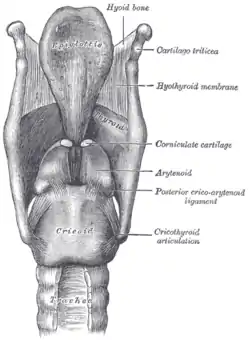 Ligaments of the larynx. Posterior view. (Corniculate cartilage labeled at center right.) | |
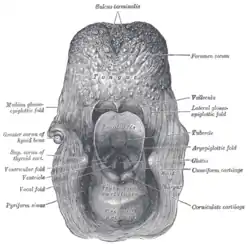 The entrance to the larynx, viewed from behind. (Corniculate cartilage labeled at bottom right.) | |
| Details | |
| Identifiers | |
| Latin | Cartilagines corniculatae |
| TA98 | A06.2.05.001 |
| TA2 | 997 |
| FMA | 55110 |
| Anatomical terminology | |
They are situated in the posterior parts of the aryepiglottic folds of mucous membrane, and are sometimes fused with the arytenoid cartilages.
Eponym
It is named by Giovanni Domenico Santorini.[1][2] The word "Corniculate" has a Latin root "cornu". Cornu means horn like projections. The projections of Corniculate cartilage look like "horns" hence the name.[3]
Additional images
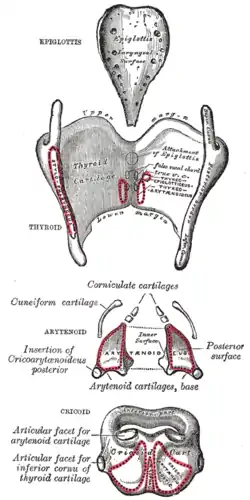 The cartilages of the larynx. Posterior view.
The cartilages of the larynx. Posterior view.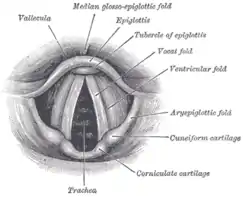 Laryngoscopic view of interior of larynx.
Laryngoscopic view of interior of larynx.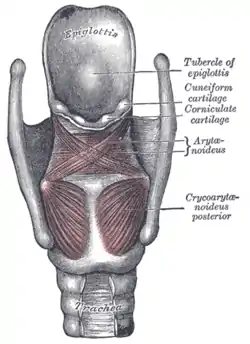 Muscles of larynx. Posterior view.
Muscles of larynx. Posterior view.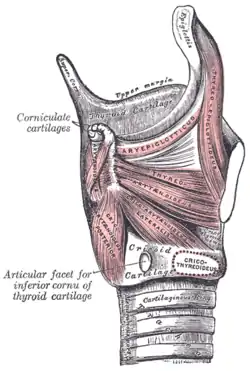 Muscles of larynx. Side view. Right lamina of thyroid cartilage removed.
Muscles of larynx. Side view. Right lamina of thyroid cartilage removed. Corniculate cartilages
Corniculate cartilages
References
![]() This article incorporates text in the public domain from page 1075 of the 20th edition of Gray's Anatomy (1918)
This article incorporates text in the public domain from page 1075 of the 20th edition of Gray's Anatomy (1918)
- synd/3088 at Who Named It?
- G. D. Santorini. Observationes anatomicae. Venetiis, apus J. B. Recurti, 1724; Leiden, 1939.
- "Farlex free dictionary:Corniculate".
External links
- Atlas image: rsa3p8 at the University of Michigan Health System
This article is issued from Wikipedia. The text is licensed under Creative Commons - Attribution - Sharealike. Additional terms may apply for the media files.